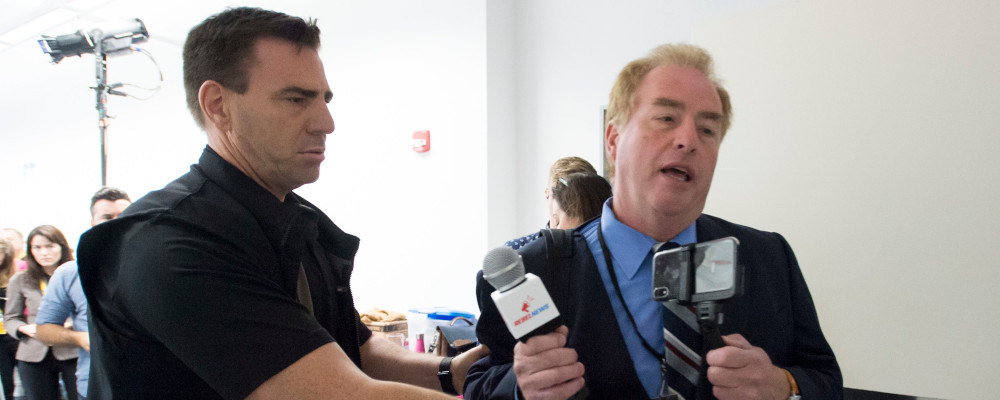The news media in Canada is in crisis. Policy responses to date are failing to solve for the information that citizens need to make informed decisions about important issues and debates. The Future of News series brings together leading practitioners, scholars, and thinkers to imagine new business models, policy responses, and journalistic content that can support a dynamic future for news in Canada.
The best part about the RCMP’s recent street mugging of David (aka the Menzoid) Menzies was neither the uproar over the arrest nor the boost it provided to Rebel News’ bottom line.
Nope. The really giggly, wincey, cringeworthy part was the huffy offence taken by so many in the legacy media after Menzies was referred to as one of them—a journalist—and by no less an influencer than the leader of His Majesty’s Loyal Opposition.
“We’re going to stop arresting journalists,” said Conservative Leader Pierre Poilievre, referring to L’affaire Menzoid. “It’s outrageous for the prime minister and his government to have journalists arrested merely for asking questions of ministers and public officials.”
Thus was the cat thrown among the pigeons. Boy, did they flutter.
Globe and Mail columnist Shannon Proudfoot described Rebel News’ (standard) response to the matter—a fundraiser—as having more in common with “busking” than journalism.

CBC and its, at times, pompous panels referred to Menzies (no relation) as either a Rebel News “employee” or “personality,” as did Global News. National Post called him a “commentator.” One CBC reference to Menzies apparently presented him as someone who “self-identified” as a journalist, as if it was an orientation.
None of those are inaccurate. But all ensured no linkage between Menzies and the J-word, a metier to which media may assign a higher social rank than the one assumed by the public.
In case you missed it, Menzies was attempting to get a quote from Deputy Prime Minister Chrystia Freeland regarding the government’s hesitance to designate Iran’s Islamic Revolutionary Guard Corps as a terrorist organization. He approached her on the street in standard fashion and then her security officer set a pick which resulted in a mild collision of shoulders between himself and Menzies. The officer thuggishly pushed Menzies against a wall and arrested him for assault. The pride of Rebel News was then handcuffed and driven from the scene only to be quickly released without charge.
Many were outraged. But there was also a cohort that justified it all because Menzies, they said, is not a “real journalist.”
Some went so far as to suggest the formation of some sort of accreditation body to decide who should be deemed qualified to report on current affairs. None seemed to realize the government has already appointed one, albeit to determine who qualifies for its loot.
These displays of ill-informed hubris were not well-received by many independents practicing freedom of the press without government approval as qualified Canadian journalism organizations.
“Mainstream media is arrogant enough to define who is a journalist while their audience shrinks to nothing while alternative media like Rebel and Western Standard explode,” grumbled a former newspaper colleague now enjoying success as an unaligned online reporter. “Many journalists now working with so-called alternative media have way more experience in the industry than those working now in the dying mainstream.”
Let’s be clear: journalism is not a profession. Read it again. Journalism is not a profession.
It is a trade, or a craft, requiring no more than two semesters of post-secondary study followed by years of apprenticeship.
Yes, universities may have turned it into an over-priced paper chase but a quick look at most courses makes it clear a profound intellect is not a prerequisite.
The greatest skill traditionally required (and it is one often abandoned due to its difficulty) involves the ability to set aside one’s own biases, eschew all assumptions, and produce truly objective work that explores all sides of issues and events.
These days, though, not everyone subscribes to that, which means we have two very broad classes of news organizations.
One is composed of those who aspire to tell stories through the lens of objectivity. For them, the pursuit of journalism is an end in itself. It is also the practice in greatest alignment with what most reader surveys indicate is how the public wishes to be served. I call these people journalists because they toil thanklessly to reveal truths that challenge preconceptions and leave decisions concerning what to think about matters up to the reader/viewer/listener.
The other is best described as agenda journalism. Those involved in this far more romantic sphere tend to see journalism as the means towards an end, whether it be social justice, free markets, environmentalism, or Palestine—pick a cause and there’s a crusader at the ready, laptop and camera in hand.
I call these people storytellers. They certainly have their fans, many of whom believe them to be true journalists because they show them the world through a lens they find agreeable.

Within those categories—both of which contribute to the explosion of voices now available—there are a number of roles. The BBC website contains a comprehensive overview.
For instance, in print, “A reporter writes stories on a range of topics including news, politics, sports, culture and entertainment. Some are correspondents which means they specialize in a field, such as sport, health, crime, business or education. Others are feature writers who cover topics in more depth or write human-interest stories.”
While in broadcast, “A presenter is the voice (radio) or face (TV) of the show. He or she welcomes the audience to the show, interviews guests, reads news, shares information, reads off autocues, and prompts audience participation.”
This is so straightforward that, were it not for the fact Canada’s media are currently squabbling over who gets what funds provided by the government, it would be difficult to understand why it matters who gets to be called a journalist.
Herein lies the inherent challenge of government intervention in the news media. If the sector was left to market forces, then consumers would decide who and what constitutes journalism. But as soon as the government established its policy regime to support the sector, it needed to set parameters to determine eligibility. It needed, in other words, to put itself directly in the business of adjudicating who is a journalist. The Menzies episode (including the mainstream media reaction) demonstrates why this is such a bad idea.
Whether the entrenched players like it or not, surely a journalist is anyone with the capability and inclination to uncover and honestly distribute the news, information, and stories the public has a right to know.
Little wonder those begging loudest for seats in the financial lifeboats are the ones most desperate to declare their virtue and lay exclusive claim to the title.
The Future of News series is supported by The Hub’s foundation donors and Meta.
Recommended for You

‘They’re voting with their eyeballs’: Sean Speer on the revealed preferences of Canadian news consumers

Kirk LaPointe: B.C.’s ferry fiasco is a perfectly Canadian controversy

‘I want to make Canada a freer country’: Conservative MP Andrew Lawton talks being a newbie in Parliament, patriotism, and Pierre Poilievre’s strategy

The state of Canada’s economy halfway through 2025




